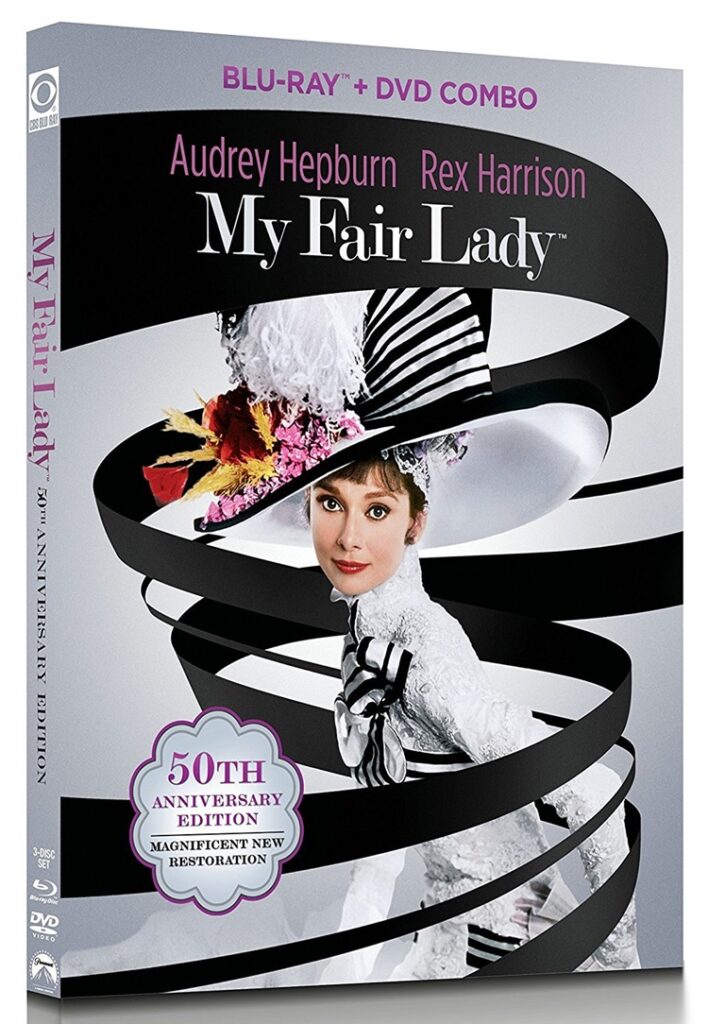
Right after we married, my wife and I took our honeymoon in Stratford, Ontario. Just like its namesake in England, Stratford is inundated with the theater. It has at least four nice theaters that perform a variety of plays all of which serve the annual Shakespeare Festival which runs from the spring to the fall every year. We caught a couple of the Bard’s celebrated plays, The Threepenny Opera, and a lovely production of My Fair Lady.
If memory serves I was vaguely familiar with the show, but I’d never seen it on the stage, nor watched the movie at that point. I probably could have hummed a few of its songs, but that’s it. It was a knock-out production. The performances were all wonderful, and the set design was fantastic. During the racehorse scene, when Eliza Doolittle is shown off for the first time, her dress got a standing ovation all on its own.
Buy My Fair Lady Blu-rayI think I’ve seen the film a couple of times since then, and I love it, but also I’m not really a musical theater guy so it isn’t something I return to often. Watching it this time, I kept having those moments like oh yeah, that song is in this, and I forgot that this scene was in this film. Which isn’t a bad feeling because all those songs and scenes are lovely.
So, My Fair Lady is a musical theater adaptation of a film entitled Pygmalion from 1938. That film was based on a stage play of the same name by George Bernard Shaw. The musical was produced on Broadway in 1956 with Rex Harrison and Julie Andrews starring. It was adapted into a Hollywood film in 1964. It was a huge hit and won a slew of awards, including eight Oscars.
Julie Andrews was not a known cinematic commodity in 1964 and so Audrey Hepburn took her place. Much has been made of this substitution over the years and indeed a quick look at my Letterboxd feed shows several modern critics complaining that she was completely miscast. At the time, Hepburn’s singing voice was considered inadequate and her songs were dubbed by Marni Nixon.
There are a couple of arguments to be made in favor of a miscast. 1.) Julie Andrews is a national treasure and she should have starred in the movie. 2.) Audrey Hepburn is far too glamorous and refined to be taken seriously as a poor uncouth girl, even if they do make her speak in a cockney accent. To which I reply: It is still Audrey Hepburn and she’s delightful everything.
Hepburn plays Eliza Doolittle, a poor flower seller in London circa 1912. While selling her wares one evening, she realizes that Professor Henry Higgins (Harrison) is taking notes on everything she says. He is a scholar of phonetics, believing that one’s station in life has more to do with how one speaks than the station one was born into. He makes a wager with his friend and colleague Colonel Hugh Pickering (Stanley Holloway) that in a few months, he could teach the girl how to speak correctly so that she could enter proper society, and even be able to fool royalty. With some cajoling, she accepts to be part of the bet and (eventually) they are off to the (horse) races.
Higgins has no feelings for Eliza, or any feelings for anybody at all, really. He’s a cold fish, a confirmed bachelor. One of those men who doesn’t allow his emotions to get in the way of his work. Certainly, he doesn’t let a woman catch his affections. He even sings a song about it “A Hymn to Him (Why Can’t a Woman Be More Like a Man?)”. He treats Eliza like a project, or an object if you will. The idea that she is a real human, with real human feelings, or that this wager will have a real and lasting effect on her doesn’t occur to him at all. The closest he comes is towards the end of the film, when she gets mad at him and leaves, and even then all he can sing is “I’ve Grown Accustomed to Her Face.”
This doesn’t sit particularly well with a modern audience. The idea that a man is needed to make a woman acceptable, that he can change her for the better is a bit off-putting in this day in age. I imagine it didn’t sit all that well back then either. In fact, the film does address this in the second act. Once Eliza has gone to a fancy ball and been well accepted as a lady of class, Higgins and Pickering do nothing but congratulate themselves, treating Eliza as if she had nothing to do with it. At this point, she has enough agency to fight with him and ultimately leave. Of course, by the film’s final moments she has come back so make of that what you will.
None of this matters much in the least. The film is an utter delight. The script by Alan Jay Lerner (who also wrote the book for the musical) is full of quotable lines. It is marvelously funny. The music is of the ages. During one of the early songs, I realized that I was moving my feet back and forth to the rhythm while sitting in my reclining theater seat. I looked over and noticed my wife and the entire row were doing the same thing.
For its 60th anniversary, Fathom Events is showing My Fair Lady, winner of eight Oscars including Best Picture, in theaters across the country. Leonard Maltin gives a loving tribute to the film before each showing. You can find full listings on the Fathom website.